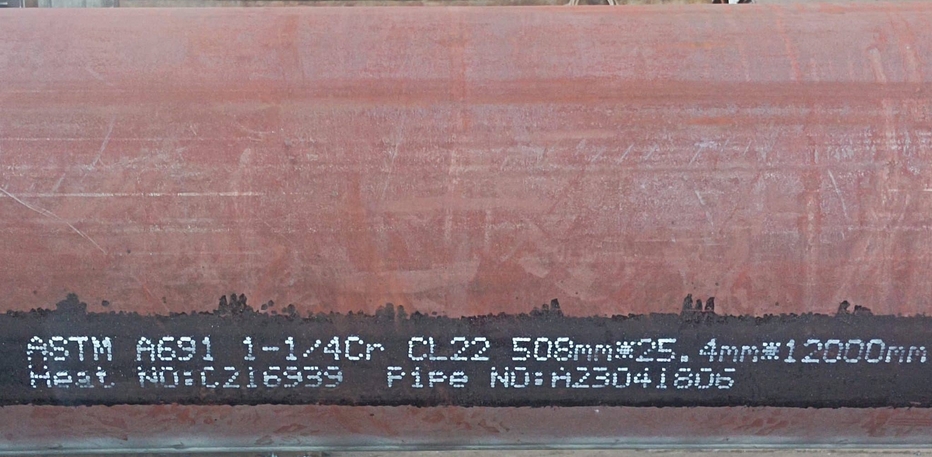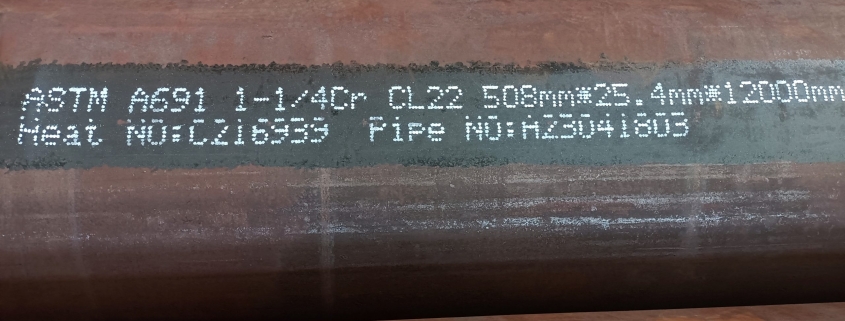All You Need to Know: ASTM A691 Carbon and Alloy Steel Pipes
Introduction
In the oil and gas industry, selecting the right materials for high-pressure piping systems is critical to ensure safety, longevity, and performance. Major players in the oil and gas sector favor ASTM A691 Carbon and Alloy Steel Pipes, particularly those designed for high-pressure service in harsh and demanding environments.
This guide will explore the features, manufacturing process, grades, applications, and common concerns regarding ASTM A691 pipes, providing valuable insights for professionals working in the oil and gas sector.
What are ASTM A691 Carbon and Alloy Steel Pipes?
ASTM A691 is a specification for electric-fusion-welded carbon and alloy steel pipes designed for high-pressure service at elevated temperatures. Manufacturers use pressure vessel-quality plate materials to make these pipes, ensuring they perform well in applications that demand strength and durability under extreme pressure and temperature conditions.
The A691 specification ensures that these pipes can withstand the harsh conditions typically encountered in oil and gas production, petrochemical industries, and power generation.
Essential Features:
High-pressure and temperature service: ASTM A691 pipes are designed to handle high pressures and elevated temperatures, making them ideal for critical applications in oil and gas processing.
Alloy options: The specification offers a wide range of alloy steel grades to cater to different mechanical and corrosion resistance requirements.
Electric-fusion-welded (EFW): This welding process ensures the structural integrity of the pipe, even in high-stress environments.

ASTM A691 1-¼Cr Cl22 EFW Alloy Steel Pipe
Manufacturing of ASTM A691 Carbon and Alloy Steel Pipes
Steel plates, typically produced under ASTM standards for pressure vessel-quality materials like ASTM A387 for alloy steels and ASTM A516 for carbon steels, undergo electric-fusion welding (EFW) to manufacture ASTM A691 pipes.
Manufacturing Procedures:
Plate Selection: To select carbon or alloy steel plates for high-pressure applications, engineers consider the specific grade and service conditions.
Plate Forming: The workers roll these steel plates into a cylindrical shape.
Electric-Fusion Welding (EFW): The welder uses electric fusion welding to join the edges of the rolled plate, thereby ensuring a continuous weld that is not only strong enough to withstand high pressures but also resilient enough to handle thermal stresses.
Heat Treatment:
Manufacturers heat-treat pipes as required by the specification to improve toughness, strength, and resistance to brittleness in high-pressure service.
Mechanical Testing: Engineers perform comprehensive tests, including tensile tests, hardness tests, and impact tests, to ensure the material meets the required mechanical properties.
This process results in pipes with excellent structural integrity and mechanical properties, making them well-suited for demanding environments.
ASTM A691 Pipe Grades for High-Pressure Service
ASTM A691 includes several grades based on the mechanical properties and chemical composition of the carbon or alloy steel. These grades offer different levels of strength, corrosion resistance, and heat resistance.
1-1/4Cr, 2-1/4Cr, 5Cr, 9Cr: These chromium-molybdenum alloy steels are used for high-temperature applications where strength and corrosion resistance are critical.
12Cr and 22Cr: These grades provide excellent heat resistance and are commonly used in power generation and refinery applications.
Grade 91: Known for its high strength and heat resistance, this grade is widely used in high-pressure boiler and heat exchanger applications.
Each grade has different mechanical and chemical properties, allowing for customization based on the application’s requirements.
Applications of ASTM A691 Carbon and Alloy Steel Pipes
The versatility of ASTM A691 pipes makes them ideal for a wide range of applications in the oil and gas industry. These pipes excel at handling high pressures, elevated temperatures, and corrosive environments.
Steam and Power Generation Systems: Power plants commonly use ASTM A691 pipes in high-pressure steam lines, where they must withstand extreme temperatures and pressures.
Refinery and Petrochemical Operations: In refineries and petrochemical plants, processing units that operate under high-temperature conditions often use these pipes.
Oil and Gas Pipelines: High-pressure transport of oil, gas, and related products requires pipes that can perform under both elevated temperatures and corrosive conditions. ASTM A691 is an excellent choice because it offers exceptional strength and outstanding resistance to corrosion, which guarantees reliability in such demanding environments. Moreover, its ability to withstand extreme conditions further reinforces its suitability for these applications.
Pressure Vessels and Heat Exchangers: These pipes are ideal for use in pressure vessels and heat exchangers, which are critical components in oil and gas processing facilities.
Solutions to Common User Concerns in Oil and Gas Applications
High-Pressure Integrity
One of the most common concerns in oil and gas operations is ensuring the integrity of piping systems under extreme pressure. Engineers design ASTM A691 pipes from high-strength carbon and alloy steel to handle the high pressures typically encountered in pipelines, pressure vessels, and steam lines.
Solution: For high-pressure applications, selecting the appropriate grade of ASTM A691 pipe ensures that the system can handle the maximum operating pressure (MOP) without risk of rupture or failure.
Temperature Resistance
In both upstream and downstream oil and gas operations, high-temperature conditions are prevalent, particularly in processes such as steam generation and chemical refining. Moreover, these extreme temperatures play a crucial role in enhancing the efficiency of various operations. Consequently, it is essential to select materials that can withstand these elevated temperatures without compromising performance. Engineers design ASTM A691 pipes to withstand high temperatures, preventing weakening or failure under such conditions.
Solution: For applications where heat resistance is a priority, consider choosing a grade with high-temperature resistance, such as 9Cr or 91. Additionally, heat treatment of the pipes can further enhance their ability to withstand extreme thermal conditions, ensuring optimal performance under challenging environments.
Corrosion Resistance
Offshore platforms and other oil and gas facilities face highly corrosive environments. Corrosion can compromise the integrity of the piping system and lead to expensive repairs and downtime. While carbon steel is not inherently corrosion-resistant, ASTM A691 includes alloy grades like 9Cr and 91, which, in contrast, offer enhanced corrosion resistance, especially in aggressive environments. Therefore, these alloy grades provide a more suitable solution for applications where corrosion resistance is critical.
Solution: In highly corrosive conditions, opt for an alloy steel grade like 9Cr that offers better corrosion resistance, or apply protective coatings or linings to the pipes to mitigate corrosion.
Material Compliance and Quality Assurance
Ensuring compliance with industry standards is critical in oil and gas operations. Poor-quality pipes can lead to failures, safety hazards, and environmental disasters. ASTM A691 pipes undergo rigorous testing for mechanical properties, pressure resistance, and heat resistance to meet the high demands of the oil and gas industry.
Solution: Verify that the ASTM A691 pipes supplied meet all the required testing standards, including ultrasonic testing, radiographic inspection, and hydrostatic pressure testing, to ensure quality and performance.
Testing and QC of ASTM A691 Carbon and Alloy Steel Pipes
ASTM A691 pipes undergo comprehensive testing to ensure they meet the necessary performance criteria for high-pressure and high-temperature service.
Hydrostatic Testing: Ensures that the pipe can withstand internal pressures without leakage or failure.
Tensile Testing: Determines the pipe’s strength and elongation to ensure it meets the mechanical property requirements for the specified grade.
Impact Testing: The toughness of the pipe material is measured, especially in applications where resistance to cracking or brittleness is particularly crucial.
Ultrasonic and Radiographic Testing: Non-destructive testing methods identify internal flaws or discontinuities in pipe welds.
These tests ensure the pipes are ready for service in the most challenging environments and comply with the stringent demands of the oil and gas industry.
Advantages of ASTM A691 Carbon and Alloy Steel Pipes
Versatility in Alloy Selection
ASTM A691 offers a wide range of carbon and alloy steel options, thereby allowing users to select the most suitable grade for their specific application. Whether the need is for high-temperature resistance, corrosion resistance, or high-pressure service, the versatility of ASTM A691 ensures that all requirements can be met effectively.
Weld Integrity
The electric-fusion welding process used in manufacturing ASTM A691 pipes provides a seamless and robust weld joint, ensuring that the pipes maintain their strength and structural integrity under extreme conditions.
Customizability
We can supply pipes in different sizes, grades, and heat treatments to meet the exact requirements of the project, delivering tailored solutions for oil and gas applications.
High-Pressure and High-Temperature Performance
ASTM A691 pipes are engineered to withstand the high-pressure and high-temperature conditions common in oil and gas operations, ensuring long-term reliability and safety.
Conclusion
The oil and gas industry requires materials that can withstand extreme pressures, as well as high temperatures and corrosive conditions, all while maintaining structural integrity and optimal performance. ASTM A691 carbon and alloy steel pipes meet these demands, providing a dependable solution for critical piping systems in power plants, refineries, petrochemical facilities, and oil and gas pipelines.
High-Pressure Service: ASTM A691 pipes are ideal for high-pressure applications, offering superior strength and reliability.
Temperature Resistance: These pipes perform exceptionally well under elevated temperatures, making them a preferred choice for steam lines and refinery operations.
Alloy Customization: With a variety of carbon and alloy steel grades available, ASTM A691 pipes can, therefore, be tailored to meet specific needs, such as enhanced corrosion resistance or improved heat resistance.
Quality Assurance: Rigorous testing ensures that ASTM A691 pipes meet the industry’s highest standards for safety and performance.
For professionals in the oil and gas industry seeking high-quality, reliable piping solutions, ASTM A691 carbon and alloy steel pipes provide the strength, versatility, and durability required for even the most challenging environments. Contact us at [email protected] for a quote for your ongoing project!




